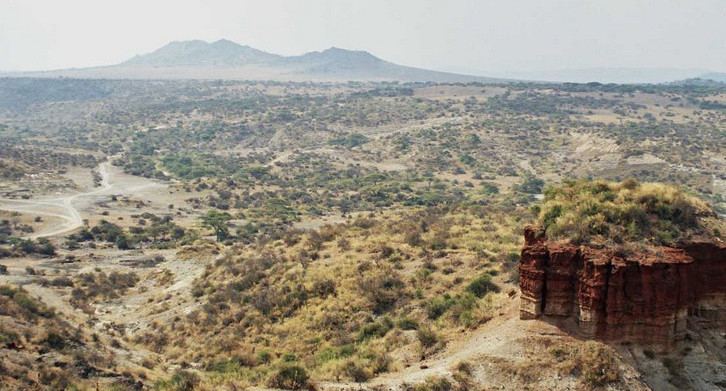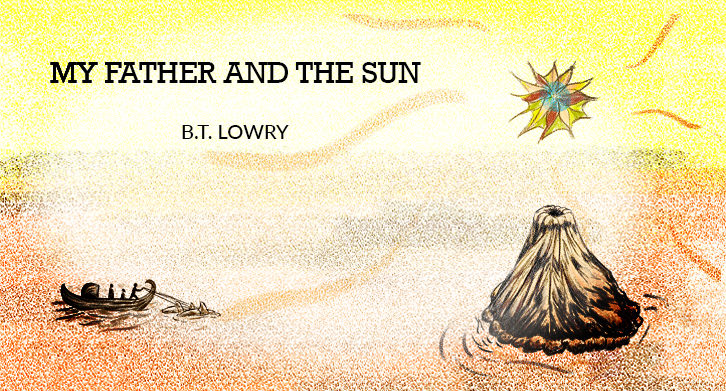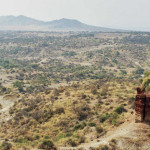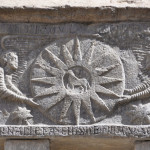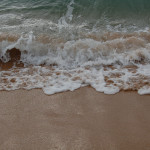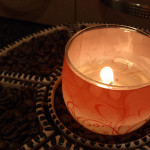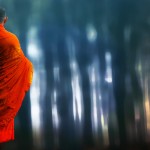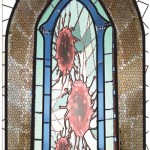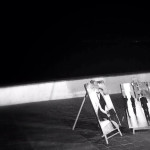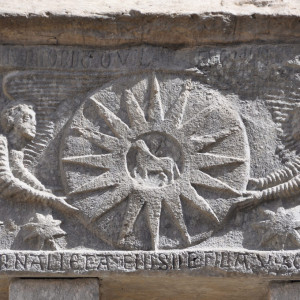There is neither time nor weight where I come from; neither gravity nor history. The Earth has whirled around the sun more than a hundred times since the first human settlers came to Sedna, and yet out there in the Kuiper belt, it remains forever the year one.
This was a great disappointment to me as a child.
I was the little boy who used to bounce amongst the tumuli that were laid out beyond the plasma shields of Resolution (inhabitable space on Sedna is too valuable to be wasted upon the dead), reading the dates written thereupon. What I wanted was to find something truly old; but there is no history there. Born: Year One; Died: Year One; that’s what the markers all said, and in a way it’s optimistic. It’s an expression of hope that maybe our little dark and struggling colony half-lost amidst the void will last through all eleven thousand four hundred Earth-orbits and make it to the year two in local time. History grows around you like a fungus, but I could not stand to wait. I went with this complaint before my tutors and all they did was laugh; if you want to see something that old, you will have to go to Earth.
Earth.
A word with a way of capturing the imagination, so distant it may as well be a fantasy. A world where people breathe the open air and drink tea in the drowned city of Singapore, or hunt bison on horseback across the grassy plains of Saskatchewan. Earth the old world; Earth the mother to us all. The idea of it transfixed me and filled my dreams with images of the yellow sun filling up the blue sky and the fish swimming through the murky ocean depths and I realized, though still a child, that this was where I had to go.
The Earth whirled round through twenty years and I watched it through my telescope, drawing up plans in secret to make my sacred pilgrimage. I told not a soul of what I was thinking, lest the act of saying it sully it with the cares of this world. There is little enough traffic between the Earth and Sedna; the occasional freighter brings in supplies, sometimes new immigrants, and turns away full of ore. There is no chance of stowing away over such a long journey, and passage out of the colony is strictly controlled. But once on a rare occasion, the colonial authority would approve a visa for travel off-world, especially for advanced training in necessary disciplines. And so I pursued my aptitudes; I devoted myself to my studies of Administration and performed so well that I was granted permission to attend a course of study at the University of Oxford on Earth.
With the pressing of a thumb-print, my goal had been achieved.
* * *
There is no gravity on Sedna, just as there is no history; nearly two million of us bob up and down in regolith tunnels like buoys upon a lake. But Mother Earth is not so relenting; she drags her wayward children down onto their hands and knees and makes them grovel upon their homecoming. And indeed, my arrival at Earth was a homecoming, even though I may never once have set foot upon that world before in my life. How could I not be home when my Mother insisted upon embracing me so tightly?
The Terrestrials with me at the spaceport may have pointed and laughed at me as I lay prostrate upon the floor, but they did not understand; for it was not just my own weight that held me down. It was the accumulated weight of four billion years of life and death, of cells dividing and mutating, of species competing and evolving, of civilizations rising and falling; it was the force of my longing for home.
How could I have focused on my studies on such a glorious world? The terrestrials failed even to appreciate it! They would walk by buildings that had been raised by Human hands a thousand years earlier and think nothing of it! They walked in open air amongst the ancient trees and complained only of the mosquito bites, or whined about the muck in which they slipped and fell, caring nothing about the microorganisms that the muck contained, or the fact that they had grown wild, each one a product of four billion years of unregulated evolution, each one a kindred to them if they cared to look back far enough.
Truly does familiarity breed contempt!
Perhaps if they had known the airless void, the featureless face of a planetoid that never changed and where no one and nothing had ever lived, they might have appreciated their bounty; instead, they shunned me, mocking me with cruel names behind my back and questioning my seriousness as a scholar. They derided my astonishment at what they imagined to be mundane, and taunted me for my loping, bowlegged gait as I grew slowly accustomed to the weight of it all.
It was only the other offworlders who understood. It was only the other prodigal children of the Earth who could sympathize with my situation. I met a Ceresean man one day while I was out watching the rain; he told me of a sect on Ceres who worshiped the Earth as I did. It had started with the prisoners there, he told me, hundreds of years ago in the mines; they believed that when they died, their souls would drift back to Earth. I was envious even of these few centuries of antiquity, but I didn’t tell him that. How remarkable it was to think that I had been following a religion for my entire life without even knowing it! He told me that there were a few of them who gathered for worship, and that I was welcome to join them. Starved of companionship, that’s exactly what I did.
* * *
I let my work pile up unheeded as I tended to my devotions. Each week we met in an abandoned temple, mosque, church, or synagogue in one of the Earth’s many ancient, abandoned cities and contemplated our Mother. I had never before known what it meant to be a part of a community of the faithful, as religion in such forms did not exist on Sedna. The Terrestrials found it ridiculous to worship the Earth as a Goddess, and maintained that Divinity existed only in heaven. But we had been to heaven, and we knew better.
Eventually, I was dismissed from my program at Oxford for failure to complete the work. The colonial authority back on Sedna ordered me to return to the Kuiper Belt, and the Terrestrial government – who regarded those who worshiped Mother Earth with suspicion – was only too happy to suspend my visa.
But centralized authority had been weak on Earth since the fall of the states, and the planet’s wide-open spaces made it far harder to govern than anywhere else in the Solar system. It was not difficult for me to hide out from the authorities, particularly not with the community of the faithful to help me. They granted me false documentation and spirited me away to Africa, to the Olduvai Gorge itself, the very birthplace of humanity.
* * *
I went there and immediately knew that it was holy ground; that the very Earth was beckoning me down, its gravity pulling me ever more deeply into that wellspring from which all life flowed. They had been excavating the remains of primordial humans from that gorge on and off for centuries, but recently the dig had come to be dominated pilgrims such as myself, until it was practically an unofficial branch of the church of Mother Earth. My fellow travelers greeted me warmly, as ever they had done, and received me into their bunkhouse. They eagerly accepted my labor in return for sheltering me; I wanted more than anything to participate in the digs themselves, but such positions were coveted by the faithful, and so my time was mostly spent cleaning, bookkeeping, repairing synthezisers and maintaining the site’s security.
Once every so often, they would grant me the privilege of sifting through the backdirt in search of coveted artifacts, and once, for a glorious moment, I imagined that I had found a fragment of fossilized bone unearthed after three million years, but it turned out to be but a stone.
I could have easily and happily grown old there in contemplation of the Great Mother, but it was not to be. For there came a night, three of Earth’s years into my sojourn there, upon which the camp was raided by the Terrestrial police. They had taken it upon themselves, mere temporal authorities that they were, to judge what humans did or did not belong on the Earth, and they had come to crack down upon those of us whom, they claimed, were living there illegally.
* * *
As fortune had it, I was not in the encampment during the raid; I and three other pilgrims had traveled that day to the nearby village to barter for replacement parts for our solar generator. Shortly after sunset, a panicked communiqué came through from the head of our order, warning us to stay where we were.
It was another two days before we returned to Olduvai.
We found that all of our fellow pilgrims had been taken during the raid. The bunkhouse was a burned ruin, and the field lab was in complete disarray. Years of our research had either been destroyed or confiscated. Even our specimens had been wrecked, thrown out of their neatly catalogued order, stomped on, and scattered across the floor. I would prefer to think that this last was done by carelessness on the part of the Police rather than outright malice, but it was true that segments of the Terrestrial government had had an adversarial relationship with the idea of evolution going back hundreds of years.
Whatever the case, we knew by the emptiness in the pits of our stomachs that there was no way we could rebuild. The four of us met each others’ solemn gazes as we stood amongst the rubble, and, though no words were spoken, it was clear that each man and woman there was thinking the same thought: our lives on Earth were over. Even if we had dodged arrest and banishment back to the dead, weightless, and history-devoid worlds of our misbegotten births–even if we could continue to dodge arrest indefinitely by living on the margins and traveling from village to village or city to city–our lives were still over. For having been this close to the Great Mother and then being forced to live away from Her would itself be a kind of death, and the thought of doing so was perfectly unbearable. And so, a mad impulse came over us.
It was I who first suggested the idea, but I think that we were all thinking it. It occurred to me immediately after I found that one of our robotic excavation units – though damaged in the attack – was still operational. Surely a machine that was designed to move earth from one place to another could just as easily bury human remains as help to dig them up.
If the police came back and found us, they would send us away; even if we took our own lives such that they found only our bodies, then we might still be denied the sacrament of interment within the Earth. But if, on the other hand, we were to inter ourselves – then, and only then, might we take our rightful place amongst the ages.
* * *
And so it is that I find myself here in this cave.
There is no more light to be had, and I no longer hear the mechanical motions of the robot from outside the wall of rock; I programmed it to set out on its own across the gorge after our grave was buried. I do not know what will happen to it in the end.
I no longer hear the breathing of my siblings either; I suppose that the Great Mother has already taken them. She is beckoning to me too. I can feel it with each labored breath. Soon, She will take me home with Her; the thought cheers me. My heart, born in exile, will soon cease its beating, and I shall be reduced to mere soil. And as the aeons pass, the weight of time and gravity will drag me down ever deeper–until I lie amongst the very bones of the Earth.
* * *
Jaime Babb is a scientific editor and mathematics instructor living in Victoria, British Columbia, though she was born in Winnipeg. Terminally indecisive, she was never able to decide whether she wanted to be a physicist or historian, so she earned degrees in both. Her fiction has previously been published in The Mad Scientist Journal and in Bundoran Press’s Second Contacts anthology. She is presently engaged in an heroic, though probably ultimately doomed battle with the laws of thermodynamics.
Talk about Jaime Babb’s “The Weight Of Years” on Sacred Earthlings.
photo credit: Olduvai Gorge – “The Cradle of Mankind” via photopin (license)

